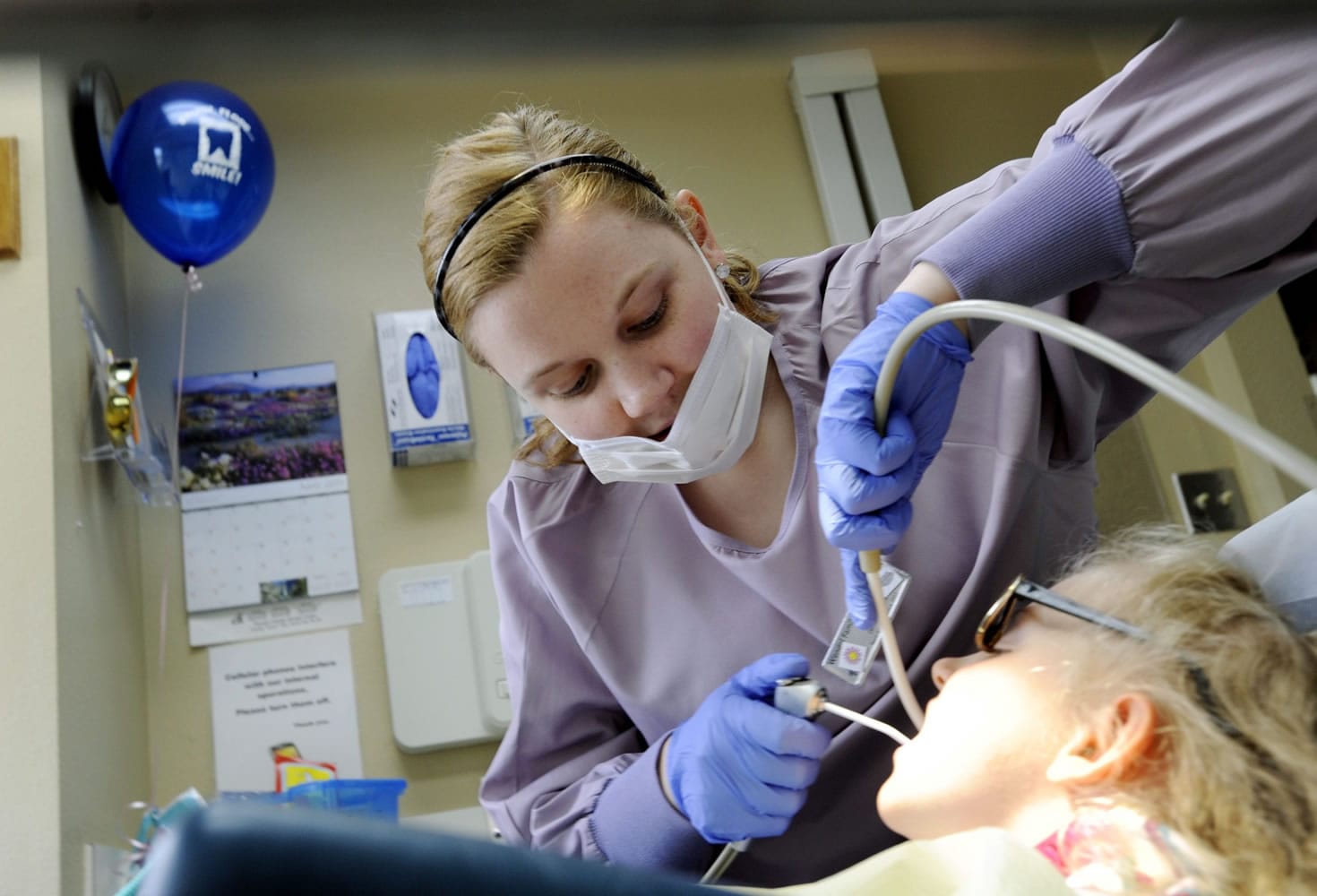A plan by the state’s largest dental insurance provider to cut reimbursement fees is raising concerns among Clark County dentists about their ability to stay in business and to serve their patients.
Jennifer Sigman, office administrator for Wendel Family Dental Centre, which has three offices in the Vancouver area, said the move by Washington Dental Service would cost Wendel “hundreds of thousands” of dollars annually in lost revenue.
It also would force the company, which employs 120 people, to issue many layoff notices, she said. That’s why Wendel is dropping Washington Dental Service, effective June 15 — the same date WDS’ insurance-fee cuts are slated to take effect.
“We just have to hope that our patients kind of let things roll out over the next six months,” Sigman said, “and give us a chance to get an idea of what to expect and where things are going to go from there.”
Washington Dental Service sees it differently. In an April 4 letter to dentists announcing the rate cuts, the company’s board of directors said it regrets the action but that it’s necessary to deal with difficult economic challenges.
Employers, seeking to reduce their employee benefit costs, are entertaining lower rates from WDS’ competitors and demanding the insurer lower its fees, according to the letter signed by the 14-member WDS board.
“If WDS does not reduce rates,” the board wrote, “employers are telling us they will obtain lower cost coverage elsewhere.”
State association weighs in
The flap underscores the fact that economic challenges in the ever-evolving health care industry aren’t limited to general hospitals and the practice of medicine. Dentists are feeling the bite, too.
The rate cuts planned by Washington Dental Service would lower reimbursement fees by an average of about 15 percent, according to the Washington State Dental Association, which has more than 4,000 members.
On April 27, the association issued a news release expressing its disappointment with WDS’ decision, saying it fears “such drastic changes to the fee structure” will have serious consequences for dentists and their patients, including layoffs at dental practices and fewer hours available to donate dental care to the needy.
Seattle-based Washington Dental Service, a member of the Delta Dental Plans Association — an organization that offers dental coverage nationally — provides insurance to an estimated 2.5 million patients in the state.
“Many dentists structure their practices using WDS patients,” said Zach Snyder, public policy coordinator for the Washington State Dental Association. And WDS has contracts to provide dental insurance with several major employers, including aerospace giant Boeing Co., Snyder said.
In its April 4 letter to dentists, Washington Dental Service’s board said lowering reimbursement fees wasn’t an easy decision and was based on an extensive analysis.
“For many years, WDS was able to provide annual provider fee increases that could be passed along to our customers,” according to the board. “In today’s competitive market this is no longer possible.”
Losses projected
Dr. Jill Markos, who has practiced general dentistry in Vancouver since 1993, said WDS has been a good insurance carrier for years. However, the organization hadn’t raised its insurance rates to cover inflation for the last three years, she said.
About 28 percent of her patients receive dental insurance through Washington Dental Service, Markos said. Now WDS wants to cut her existing reimbursement fees for everything from preventive care and fillings to crowns.
If she were to stay with WDS, Markos said, she’d take major losses in revenue.
So, just as Wendel has done, Markos has decided to cut ties with WDS. That will make her an out-of-network provider for patients who receive insurance through Washington Dental Service programs.
Markos said she expects she will lose some patients. However, she said, she has good relationships with other insurance carriers and no debts.
Markos said the fallout from the situation with Washington Dental has been strange. She recently received a letter from an overseas dental lab informing her that she could reduce overhead costs by contracting with the company.
Markos, who has her lab work done in Seattle, said she’s not going to do that.
What she plans to do is focus on persuading more people to come to her for their dental care. “I’m just going to pull myself up by the bootstraps, start doing direct mail and hitting harder on the Internet,” she said.
Challenges loom
The Wendel dental practice sees about 7,000 to 8,000 patients annually who receive insurance through Washington Dental Service programs.
Sigman, the office administrator for Wendel, said she expects the dental practice will lose some of those patients because of its decision to end its relationship with WDS.
That’s because those patients won’t accept the higher out-of-pocket costs that will come with seeking dental care from an out-of-network provider.
However, Sigman said, “we have longtime patients who won’t leave.” Meanwhile, Wendel is working on some internal programs to help alleviate the higher out-of-pocket costs that some of its patients will experience, Sigman said. Sigman said Washington Dental Service’s decision to cut its rates is going to hit small dentistry offices harder than big ones. She predicted some dentists will be put out of business.
Sigman said she’s not sure how many patients Wendel will keep or lose because of the controversy with WDS. “It’s a risk we’re willing to take,” she said, “because we don’t want to be controlled by the insurance companies.”




